[Update: for a much more astute review see Great Bong's review at Random Thoughts of a Demented Mind.]
After the (Anchorage International Film) festival, there were just two movies we wanted to see: Milk and Slumdog Millionaire. I've already posted on Milk, which I think is a very well made and powerful movie. We saw Slumdog the other day.
India is probably one of the more fascinating places on this globe. Even calling it a 'place' is misleading. It's a different world, a different time, a different reality. It's got a huge population. It is a mix of so many landscapes and cultures. It has incredibly rich and unimaginably poor people. It's part of the 21st Century, yet the last ten centuries, at least, continue to exist simultaneously. Perhaps most significant, India probably is the biggest countervailing force to the West's materialism. (The whole idea of the movie - winning on the tv show "Who Wants to be a Millionaire - would seem to belie that characterization, but India is still big enough to swallow up and trivialize the tens, maybe hundreds, of millions of Indians who are caught up in Western materialism.) India, for centuries, has had the most advanced knowledge of internal human capabilities. Indian yogis and the many other spiritual traditions have mastered the discipline, certainly equivalent to the discipline required in Western science, of gaining control of one's own human body. Rather than being a technical fix you can plug in, it requires decades, lifetimes even, of focus and discipline and simultaneously letting go.
The world of English literature has been enriched hugely by Indian writers writing novels in English. Salman Rushdie. Vikram Seth. Arundhati Roy. The Indian movie industry has its own traditions ranging from the austere films of Satyajit Ray [Jan 2015 - noticed the old link was bad, changed to another] or the psychedelic exhuberance of Bollywood.
So, I was looking forward to this British movie told from an Indian perspective, a boy from the slums of Bombay who wins big in the Indian version of Who Wants to Be a Millionaire. [update: Yes, the filmmaker is Western, but unlike many other Western made films, the focus isn't on a Westerner in the other culture, such as in The Last King of Scotland, or Blood Diamonds.]
I was only moderately pleased when I left the movie. Probably without the hype it would have been much more enjoyable. Yes, go see the movie. It's fun. It's a good movie. It teaches more about India than most Americans will ever know. It's just not the great movie that is being hyped. It gives glimpses of India. The way the story is woven together - which I won't disclose - is clever and moves both narratives along nicely. The bollywood ending is contagious.
After a couple of days of thought - no, I didn't sit and think about this for three days, but rather, my brain distilled it in the background while I did other things - I can articulate one key issue I have with the movie, which may be the cause of my disappointment.
Despite the fact that the three main characters are children of the slums of Bombay, and that much of the movie takes place in those slums, the movie manages to use the slums as a backdrop only. I'm not sure how it happened, but we don't at all get to know the slum, to feel it, to smell it, to ache with it and for it. Perhaps the rise out of the slum of the three main characters makes it less menacing. Reagan was called the teflon President, none of the problems of his administration stuck to him. The three characters - while enormously impacted by the slums - seem to have that same teflon coating. The problems of the slums - perhaps the outhouse scene illustrates this most graphically - are there, but they slide off and we go to the next scene. It's not that the film doesn't depict horrible situations - rioters rampaging through the slums to kill Muslims, a child's eyes gouged out so he can beg more successfully. But somehow, through the main characters, we seem to be immune from all this.
Maybe conveying the slums is just too overwhelmingly depressing. But I think it can be done. Gregory David Roberts, for example in his book Shantaram seems to capture some of the spirit of the Bombay slums. He makes us feel its oppression, but also to see that despite what looks totally unlivable from a Western perspective, the inhabitants, like everyone else, live rich lives with joys as well as suffering. But he had over 900 pages to make it work. I'm hoping director Mira Nair, with Johnny Depp, can keep that sense of the slums in the film version scheduled for a 2011 release.
I heard in an interview that it was Danny Boyle's (the director) first time in India. Maybe that explains it. We've seen a number of movies that featured India in the last couple of years, most of which seemed more authentic, connected more on the emotional level.
The trailer is so promotional that it trivializes the whole movie. So I'm putting up this clip I found online. This is just one scene, not particularly noteworthy.
[Update, 22 Feb 2009 - Thai time: This NY Times article discusses what I tried to get at with my comments about Shantaram - that the slums of Mumbai are really far richer, safer, and more productive than our stereotypes.]
Pages
- About this Blog
- AIFF 2024
- AK Redistricting 2020-2023
- Respiratory Virus Cases October 2023 - ?
- Why Making Sense Of Israel-Gaza Is So Hard
- Alaska Daily COVID-19 Count 3 - May 2021 - October 2023
- Alaska Daily COVID-19 Count - 2 (Oct. 2020-April 2021)
- Alaska Daily COVID-19 Count 1 (6/1-9/20)
- AIFF 2020
- AIFF 2019
- Graham v Municipality of Anchorage
- Favorite Posts
- Henry v MOA
- Anchorage Assembly Election April 2017
- Alaska Redistricting Board 2010-2013
- UA President Bonus Posts
- University of Alaska President Search 2015
Thursday, December 25, 2008
Wednesday, December 24, 2008
December Anchorage Sun and Snow, Copying 8mm Film
I found some 8mm film labeled Thailand a while back. I wanted to transfer it to digital and put it on a DVD so I could take it with me to Thailand when I return in a couple of weeks. I'm not even sure what's on it, I just know it was taken around 1967-68.
 Someone lent me an old 8mm projector and a Copy Kit - a mirror that projects the image onto a plastic screen. Then I'm supposed to video tape the screen. I tried just running the film.
Someone lent me an old 8mm projector and a Copy Kit - a mirror that projects the image onto a plastic screen. Then I'm supposed to video tape the screen. I tried just running the film.
 But the projector chewed up my 3 foot leader. Then I got some of it to work, but then the film broke. Again the film was being crumpled up somewhere in the process. I mentioned this to a friend the other day who said he had an old projector that probably wouldn't eat the film. So today I went over and interrupted him clearing his driveway and street to borrow it.
But the projector chewed up my 3 foot leader. Then I got some of it to work, but then the film broke. Again the film was being crumpled up somewhere in the process. I mentioned this to a friend the other day who said he had an old projector that probably wouldn't eat the film. So today I went over and interrupted him clearing his driveway and street to borrow it.

It snowed yesterday and today the sky is clear. These were shot between 10:25am and 10:30am this morning. The sunrise here in Anchorage was officially 10:15am. The picture with the bike crossing the street is looking south on Lake Otis, at 36th. There's enough trees and whatever to hide the just up sun rising from the south.

Here's a peek to the left (east) at the mountains. This is where 36th changes its name to Providence.

Now, later on, about 2:30pm, you can actually see the sun, maybe 6˚ or 7˚ above the horizon. But solstice is past so every day now we're gaining some light.
I'm setting up this new projector and let's see if I can get some of this film digitized without destroying too much of the old film.
 Someone lent me an old 8mm projector and a Copy Kit - a mirror that projects the image onto a plastic screen. Then I'm supposed to video tape the screen. I tried just running the film.
Someone lent me an old 8mm projector and a Copy Kit - a mirror that projects the image onto a plastic screen. Then I'm supposed to video tape the screen. I tried just running the film. But the projector chewed up my 3 foot leader. Then I got some of it to work, but then the film broke. Again the film was being crumpled up somewhere in the process. I mentioned this to a friend the other day who said he had an old projector that probably wouldn't eat the film. So today I went over and interrupted him clearing his driveway and street to borrow it.
But the projector chewed up my 3 foot leader. Then I got some of it to work, but then the film broke. Again the film was being crumpled up somewhere in the process. I mentioned this to a friend the other day who said he had an old projector that probably wouldn't eat the film. So today I went over and interrupted him clearing his driveway and street to borrow it.
It snowed yesterday and today the sky is clear. These were shot between 10:25am and 10:30am this morning. The sunrise here in Anchorage was officially 10:15am. The picture with the bike crossing the street is looking south on Lake Otis, at 36th. There's enough trees and whatever to hide the just up sun rising from the south.

Here's a peek to the left (east) at the mountains. This is where 36th changes its name to Providence.

Now, later on, about 2:30pm, you can actually see the sun, maybe 6˚ or 7˚ above the horizon. But solstice is past so every day now we're gaining some light.
I'm setting up this new projector and let's see if I can get some of this film digitized without destroying too much of the old film.
Tuesday, December 23, 2008
FBI Whistle-Blower Document Copy
The ADN was very responsive and quickly added the link to the actual Whistle-Blower document after being notified it wasn't up. Here is that document. You can use the down arrow on the right of the tool bar to enlarge the document.
256-2 Whistle Blower Complaint.source.prod Affiliate.7
I'm just putting this up for now without comment, because I haven't had a chance to read it and think about it. I'll either add an update here or I'll do another post.
256-2 Whistle Blower Complaint.source.prod Affiliate.7
Publish at Scribd or explore others:
I'm just putting this up for now without comment, because I haven't had a chance to read it and think about it. I'll either add an update here or I'll do another post.
Labels:
Alaska,
ethics/corruption,
FBI,
politics,
Ted Stevens
Political Oxygen and are the FBI Losing Oxygen?
On the show Law and Disorder this morning, Paul Buhle, talking about the current political times, said:
But it looks like the Bush administration's violations have been so outrageous, and the political, social, and economic consequences so extreme, that people are beginning to stand up and say, "No more."
I like the phrase "political oxygen." (But I hope that its use is limited, that it doesn't become a cliche used by everyone until it has no meaning anymore.) I take it to mean that the people who make up this democracy are waking up from their political oxygen deprivation and now will become politically active to demand accountability from their elected officials and the public administrators who carry out the functions of government. But it is clear, we're talking about political oxygen for the left now. This means not simply rooting out the relatively few problems, but also giving support to the honest, competent politicians and administrators who often get trashed or marginalized when they speak truth to power.
This theme of holding politicians accountable was discussed on this morning's Law and Disorder too. The show was aired in Anchorage on KWMD - 104.5 or 87.7 FM. They discussed the necessity of , as well as the obstacles to, prosecuting members of the Bush administration who committed crimes. Without holding the current administration accountable, they argue, there is no deterrent to prevent future administrations from pursuing similar paths. The likelihood that Bush will sign broad pardons to protect both the low level and high level criminals in his administration was a key concern however.
Related to all this, but in ways I haven't digested yet are ADN's lead story today by Richard Mauer about the FBI informant's report alleging misconduct in the FBI investigation on Alaska corruption, particularly as it affected the Ted Stevens trial. I'll try to discuss this when I've read the report, or at least those parts that aren't redacted. The ADN website has a link labeled Court Whistle-Blower Document. I thought it would be the whistle-blower's actual document, but it links to Judge Sullivan's decision to release the document.
My initial reaction is that the rules for dealing with undercover informants is pretty loosey-goosey. Last December I mused on the ethics and rules of surveillance and touched the topic of working with undercover informants who are also players in the criminal activity. If you watch any tv cop shows - I think The Wire is probably one of the best for this - the cops have to play a lot by ear. They have to gain the trust of the informant, they have to be careful not to inadvertently out' the informant, and they have to make sure the informant isn't gaming them. So to claim that the agents broke the 'rules' as this whistle-blower apparently does, well, I'd have to ask, "What are the rules?" Perhaps they're in the document.
"We have entered a new era, the nation has acquired more political oxygen than it has in a long time."I recently talked about how "out-there radicals" stretch the political agenda in my post on Milk. There's been "political oxygen" for the Right since the Reagan election. And since that time 'center' has moved steadily rightward, so much so that many of Richard Nixon's policies would be considered far left today, and they've been doing their best to repeal them - Affirmative Action, Clean Air and Clean Water Acts, for instance.
But it looks like the Bush administration's violations have been so outrageous, and the political, social, and economic consequences so extreme, that people are beginning to stand up and say, "No more."
I like the phrase "political oxygen." (But I hope that its use is limited, that it doesn't become a cliche used by everyone until it has no meaning anymore.) I take it to mean that the people who make up this democracy are waking up from their political oxygen deprivation and now will become politically active to demand accountability from their elected officials and the public administrators who carry out the functions of government. But it is clear, we're talking about political oxygen for the left now. This means not simply rooting out the relatively few problems, but also giving support to the honest, competent politicians and administrators who often get trashed or marginalized when they speak truth to power.
This theme of holding politicians accountable was discussed on this morning's Law and Disorder too. The show was aired in Anchorage on KWMD - 104.5 or 87.7 FM. They discussed the necessity of , as well as the obstacles to, prosecuting members of the Bush administration who committed crimes. Without holding the current administration accountable, they argue, there is no deterrent to prevent future administrations from pursuing similar paths. The likelihood that Bush will sign broad pardons to protect both the low level and high level criminals in his administration was a key concern however.
Related to all this, but in ways I haven't digested yet are ADN's lead story today by Richard Mauer about the FBI informant's report alleging misconduct in the FBI investigation on Alaska corruption, particularly as it affected the Ted Stevens trial. I'll try to discuss this when I've read the report, or at least those parts that aren't redacted. The ADN website has a link labeled Court Whistle-Blower Document. I thought it would be the whistle-blower's actual document, but it links to Judge Sullivan's decision to release the document.
My initial reaction is that the rules for dealing with undercover informants is pretty loosey-goosey. Last December I mused on the ethics and rules of surveillance and touched the topic of working with undercover informants who are also players in the criminal activity. If you watch any tv cop shows - I think The Wire is probably one of the best for this - the cops have to play a lot by ear. They have to gain the trust of the informant, they have to be careful not to inadvertently out' the informant, and they have to make sure the informant isn't gaming them. So to claim that the agents broke the 'rules' as this whistle-blower apparently does, well, I'd have to ask, "What are the rules?" Perhaps they're in the document.
Labels:
ethics/corruption,
FBI,
Knowing,
politics,
power,
Ted Stevens
Sunday, December 21, 2008
New York Times: Ted Stevens' Departure's Impact on Lobbyists
Monay's New York Times has an article on the shakeup among lobbyists as Ted Stevens leaves the Senate, particularly a coterie of former Stevens staffers who left to become rich by lobbying Stevens. (Some did claim to have lots of other non-Stevens business, thank.) I suspect as time goes by, we'll be seeing more and more of what was going on behind the facade of the Uncle Ted image. Here are a few clips from the article. Click on the link above for the whole article.
With Stevens’s Fall, Pipeline for Lobbyists Shuts Off
The article acknowledges that other Senators have done the same thing...
His power made his good will a valuable commodity on K Street, where many lobbying firms are located. During the past five years, just nine lobbyists and firms known primarily for their ties to Mr. Stevens reported over $60 million in lobbyist fees, not including other income for less direct “consulting.” The most recent person to leave his staff to become a lobbyist reported fees of more than $800,000 in just the last 18 months. . .
Mr. Stevens’s preference for one lobbyist over another was big news in industry trade publications, and he did not hesitate to exert his influence. . .
But Mr. Stevens — Alaska’s “Uncle Ted” — is in a class by himself. For most of the last decade he was a dominant voice on both the Senate appropriations and commerce committees, which govern federal spending and business regulation.
23 Uses for Your Digital Camera
The film camera used to be good for capturing images - landscapes, faces - to document where we'd been, what we'd done, and people we'd met, things we'd seen. When I was a student in Germany in the mid 60s, my 12 print rolls of color pictures were relatively expensive to print and it would take a while for me to finish a roll and then - I don't even remember how long it took from when I dropped it off at the shop til I could get the pictures. When I was a Peace Corps volunteer in Thailand a few years later, with my brand new Pentax, I could get black and white pictures developed in town in a day or two. But there were either 24 or 36 pictures on a roll and it could take days to weeks before I finished a roll. My color slides had to be sent to Hong Kong or Australia to be developed and that took at least two weeks before I could get my pictures back.
I could get black and white pictures developed in town in a day or two. But there were either 24 or 36 pictures on a roll and it could take days to weeks before I finished a roll. My color slides had to be sent to Hong Kong or Australia to be developed and that took at least two weeks before I could get my pictures back.
Digital cameras change all that. Now you can see your picture immediately. It's not on film, so you can take all the pictures you want without thinking about using up film. You can just delete the bad ones. The pictures are digital so you can upload them to your computer, email them, send them on your cell phone. You can enlarge them, crop them, even fiddle with the colors and exposure.
The pictures are digital so you can upload them to your computer, email them, send them on your cell phone. You can enlarge them, crop them, even fiddle with the colors and exposure.
So, this means that the digital camera is a tool with many uses that old film cameras never had. Below is a list of ways I've found mine to be useful - in general categories, and then with specific examples.
The main ways I use my camera are as a portable note pad and a copy machine.
Use Your Digital Camera as a Note Pad
 1. What's in those boxes in the basement? Take pictures as you load them up.
1. What's in those boxes in the basement? Take pictures as you load them up.
 2. There's a map on the sign, but will you remember the path when you leave the sign? Take the sign with you.
2. There's a map on the sign, but will you remember the path when you leave the sign? Take the sign with you.


3. How do you describe the part you need at the computer store or to the plumber? Take it on your digital camera. Of course this goes for all sorts of things that you can't take with you.

4. How do you describe your suitcase to the lost luggage people at the airport? Show them the picture.
 5. Keep track of the information on the for rent signs you pass and what the place looks like.
5. Keep track of the information on the for rent signs you pass and what the place looks like.
6. Where did I park the car?


7. Ordering food in foreign countries - take a picture of food you like to show the waiter, or of a menu with things you like marked.

8. Take a picture of your hotel or other destinations to show the taxi when you want to go back
 9. Wonder what kind of flower it is? Take a picture then ask someone at a nursery.
9. Wonder what kind of flower it is? Take a picture then ask someone at a nursery.
 10. How will I remember all these people I just met and their names? Sometimes you need to ask them to write it in English though too.
10. How will I remember all these people I just met and their names? Sometimes you need to ask them to write it in English though too.
11. Damn, where did I put my to do list? Click.
 12. I want a copy of this legal document, but they charge $1 a page to print - just take a picture of the computer screen. Also good for your airlines reservations or that I paid my bill on line.(You can do a screen saver too, but not if it's a public computer.)
12. I want a copy of this legal document, but they charge $1 a page to print - just take a picture of the computer screen. Also good for your airlines reservations or that I paid my bill on line.(You can do a screen saver too, but not if it's a public computer.)
 13. I really like this camcorder, (jacket, necklace) but I need to check with my wife before buying it. Snap. (get the price tag too.)
13. I really like this camcorder, (jacket, necklace) but I need to check with my wife before buying it. Snap. (get the price tag too.)
 14. That's a nice fence, (door, window.) Wonder if I could make/find one like that? Just so I don't forget what it looked like, snap.
14. That's a nice fence, (door, window.) Wonder if I could make/find one like that? Just so I don't forget what it looked like, snap.

15. Meeting notes on the white board. Just snap 'em.
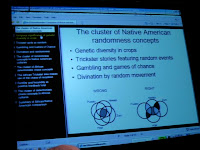 16. Lecture going too fast? Take digital notes.
16. Lecture going too fast? Take digital notes.
 17. What's the license plate number of your rental car?
17. What's the license plate number of your rental car?
18. Document dings and scratches on rental cars before you drive off
19. Audio memos - Use the audio memo function to have some someone give directions in the local language and play it for a local when you need help.
Use Your Digital Camera as a Copier
 20. Need to have a copy of a price quote, birth certificate, or passport (or any piece of paper)? Just take a picture.
20. Need to have a copy of a price quote, birth certificate, or passport (or any piece of paper)? Just take a picture.
21. This recipe looks great. Snap.
Video - some things are hard to explain in writing, so use the video feature on your camera
22. Want to leave instructions for a house sitter? Video tape where the garbage bags are and how much to water the plants, etc.
23. Video instructions for how to do something - here, how to say 'hello' in the Karen language
 I could get black and white pictures developed in town in a day or two. But there were either 24 or 36 pictures on a roll and it could take days to weeks before I finished a roll. My color slides had to be sent to Hong Kong or Australia to be developed and that took at least two weeks before I could get my pictures back.
I could get black and white pictures developed in town in a day or two. But there were either 24 or 36 pictures on a roll and it could take days to weeks before I finished a roll. My color slides had to be sent to Hong Kong or Australia to be developed and that took at least two weeks before I could get my pictures back.Digital cameras change all that. Now you can see your picture immediately. It's not on film, so you can take all the pictures you want without thinking about using up film. You can just delete the bad ones.
 The pictures are digital so you can upload them to your computer, email them, send them on your cell phone. You can enlarge them, crop them, even fiddle with the colors and exposure.
The pictures are digital so you can upload them to your computer, email them, send them on your cell phone. You can enlarge them, crop them, even fiddle with the colors and exposure.So, this means that the digital camera is a tool with many uses that old film cameras never had. Below is a list of ways I've found mine to be useful - in general categories, and then with specific examples.
The main ways I use my camera are as a portable note pad and a copy machine.
Use Your Digital Camera as a Note Pad
 1. What's in those boxes in the basement? Take pictures as you load them up.
1. What's in those boxes in the basement? Take pictures as you load them up. 2. There's a map on the sign, but will you remember the path when you leave the sign? Take the sign with you.
2. There's a map on the sign, but will you remember the path when you leave the sign? Take the sign with you.

3. How do you describe the part you need at the computer store or to the plumber? Take it on your digital camera. Of course this goes for all sorts of things that you can't take with you.

4. How do you describe your suitcase to the lost luggage people at the airport? Show them the picture.
 5. Keep track of the information on the for rent signs you pass and what the place looks like.
5. Keep track of the information on the for rent signs you pass and what the place looks like.6. Where did I park the car?


7. Ordering food in foreign countries - take a picture of food you like to show the waiter, or of a menu with things you like marked.

8. Take a picture of your hotel or other destinations to show the taxi when you want to go back
 9. Wonder what kind of flower it is? Take a picture then ask someone at a nursery.
9. Wonder what kind of flower it is? Take a picture then ask someone at a nursery. 10. How will I remember all these people I just met and their names? Sometimes you need to ask them to write it in English though too.
10. How will I remember all these people I just met and their names? Sometimes you need to ask them to write it in English though too.11. Damn, where did I put my to do list? Click.
 12. I want a copy of this legal document, but they charge $1 a page to print - just take a picture of the computer screen. Also good for your airlines reservations or that I paid my bill on line.(You can do a screen saver too, but not if it's a public computer.)
12. I want a copy of this legal document, but they charge $1 a page to print - just take a picture of the computer screen. Also good for your airlines reservations or that I paid my bill on line.(You can do a screen saver too, but not if it's a public computer.) 13. I really like this camcorder, (jacket, necklace) but I need to check with my wife before buying it. Snap. (get the price tag too.)
13. I really like this camcorder, (jacket, necklace) but I need to check with my wife before buying it. Snap. (get the price tag too.) 14. That's a nice fence, (door, window.) Wonder if I could make/find one like that? Just so I don't forget what it looked like, snap.
14. That's a nice fence, (door, window.) Wonder if I could make/find one like that? Just so I don't forget what it looked like, snap.
15. Meeting notes on the white board. Just snap 'em.
 16. Lecture going too fast? Take digital notes.
16. Lecture going too fast? Take digital notes. 17. What's the license plate number of your rental car?
17. What's the license plate number of your rental car?18. Document dings and scratches on rental cars before you drive off
19. Audio memos - Use the audio memo function to have some someone give directions in the local language and play it for a local when you need help.
Use Your Digital Camera as a Copier
 20. Need to have a copy of a price quote, birth certificate, or passport (or any piece of paper)? Just take a picture.
20. Need to have a copy of a price quote, birth certificate, or passport (or any piece of paper)? Just take a picture.21. This recipe looks great. Snap.
Video - some things are hard to explain in writing, so use the video feature on your camera
22. Want to leave instructions for a house sitter? Video tape where the garbage bags are and how much to water the plants, etc.
23. Video instructions for how to do something - here, how to say 'hello' in the Karen language
Labels:
cross cultural,
Knowing,
media,
photo,
travel
Saturday, December 20, 2008
Milk
We just got back from seeing Milk, the movie.
I'm not quite sure what to say. I found it incredibly powerful. I think everyone should go see the movie. It has everything a good movie needs - sex, violence, villains, heroes, and powerful acting. I'm trying to imagine someone who feels that homosexuality is evil going to see that movie. I can't imagine that at least a tiny crack wouldn't appear in his or her world view. Maybe my imagination just isn't strong enough.
But while the movie is ostensibly about the battle for gay rights, for me it's about the battle for human rights and justice. (Milk, at one point in the movie gets angry at the other politicians who want to avoid mentioning gays in the fight against an anti-gay rights amendment. They think it is politically safer to talk about civil rights. So I want to be clear, this IS a movie about gay rights. But is also about all human rights.) Any human being who has red blood flowing through her veins has to be touched by this movie on some level. I couldn't help but be affected by a man standing up in the face of overwhelming odds, and simply refusing to accept injustice. Not being timid, not being politic, but standing up and speaking his truth the world.
It causes me to think about my style here. I don't write in declaratory sentences. I try to imagine how someone who disagrees with me thinks about the issue. I try to figure out what someone would have to believe - what facts, what values - that lead him to a conclusion different from mine. Sometimes my gut just wants me to declare "That's bullshit." But then I erase it and start trying to examine the ideas more closely. And sometimes, in my own understated way, I do say, "That's bullshit." But it's pretty rare.
During the Vietnam war protests, I came to see that there is a role for different approaches. The way-out-there radicals who invaded draft boards and poured blood on the draft records pushed the debate into territory it had never been. They were often intemperate, obnoxious, and self-righteous, but they created a lot more room on the debate floor. Others, who would have seemed extreme had the more aggressive protesters not existed, then began to seem reasonable in comparison.
Milk, as portrayed in this film, seemed to be able to do both. He managed to push the debate into new territory, yet he managed to be reasonable and understanding.
I've tended to think that each of us should do what we do best. It is hard for me to stand up and declare truth when I can see lots of different perspectives. On many issues I know which one I think is 'right' but understanding why others think something else is right, seems to be the opening to find non-violent solutions. But Milk also reminds me that we can sometimes use logic and reason as a way simply to be safe, to not take the necessary risks. He shows that if we speak from our hearts, others will hear us, others who are afraid to take that step. He died because he stood up, but if he hadn't stood up, he wouldn't have lived either. He moved civil rights in the US a long way forward.
So this film, for me, raises questions about how I want to live the rest of my life. Milk reminds me how much someone can accomplish when they focus. As I've compared my approach to those of some other bloggers, I've concluded that I tend to have a general goal of pushing people to see things they haven't seen before; that my subject is how we know things, how we come to conclusions - about how things work, about what's right and wrong. Many other bloggers tend to focus on specific issues and attempt to change minds on those issues. I do that to some extent, but my larger focus is getting people to change how they take in and digest information, so that on all the issues they will face in the future, they will be a little more open to seeing things from different perspectives, to questioning the how's, the why's of what they see. I think that's the right path for me, but Milk causes me to consider working harder at it.
Yesterday I had lunch with Rick Benjamin. I first met Rick when I was working with the Anchorage Municipal Board of Ethics as a volunteer consultant when they were revising the Municipal Code of Ethics. Rick was the pastor at an Evangelical Christian church. Yet he didn't behave the way I thought someone like that should behave. He listened to what others said. He was modest, made jokes, and used logic and reason. I don't recall any references to God or any piousness on his part. He was a regular guy. I saw him, maybe once a month, for two or three years at meetings.
Some time after the Ordinance finally passed - and it was a long road - I invited Rick to come over for lunch. I said I wanted to ask him questions about Evangelicalism and Fundamentalism. We had an engrossing discussion out on the deck over sandwiches. He answered all of my questions thoughtfully and candidly and many of his answers were not what I expected. He wasn't doctrinaire, he acknowledged inconsistencies.
So when the Ex-Gay Conference was held at his church this fall (he was no longer the lead pastor if I have my fact straight,) I really wanted to talk to Rick and ask him what the hell was going on. But it was busy times, I was traveling, Sarah Palin was grabbing all of our attention, and I never made my call. But about a month or so ago, Rick called me to invite me to do an ethics presentation at his class at Wayland Baptist University. So I said I'd like to talk to him about the ex-gay conference too. He said, 'sure, let's have lunch.' And yesterday we did. We talked about lots of things. It was an honest discussion between the two of us, and I went as a friend, not as a blogger. But towards the end of lunch, my blogger identity began to wake up, and I asked if I could blog some of the discussion. He said, "Sure."
But while we were talking I hadn't been in record mode and so I suggested we meet again and he agreed. I'm hoping we can do this before I leave for Thailand. I decided not to raise it in yesterday's post, but after seeing Milk, I think it is important to raise. For many, the Rick Benjamins of the world are the enemy. If there are other Rick Benjamins in the Evangelical movement, I think that the differences between Progressives and Evangelicals may not be nearly as great as we've allowed ourselves to believe. Many in their movement have bought the stereotypes of Progressives and many Progressives have bought the stereotypes of the Evangelicals. That meant, in a lot of cases, both sides wrote each other off, and let the media reinforce their horned visions of each other. Obama's campaign didn't make that mistake. And a number of Evangelicals began to wonder whether the Bush administration had used and abused them.
The human heart is a remarkable and complicated organ. Ultimately, combined with the brain, it can do wonders. I strongly believe that most hate is self-hate re-directed at others. (In the movie, for example, Milk believes that Dan White is a very closeted gay.) If we can get more people to raise kids who feel good about themselves, we can greatly limit the amount of hate in the world.
I'm not quite sure what to say. I found it incredibly powerful. I think everyone should go see the movie. It has everything a good movie needs - sex, violence, villains, heroes, and powerful acting. I'm trying to imagine someone who feels that homosexuality is evil going to see that movie. I can't imagine that at least a tiny crack wouldn't appear in his or her world view. Maybe my imagination just isn't strong enough.
But while the movie is ostensibly about the battle for gay rights, for me it's about the battle for human rights and justice. (Milk, at one point in the movie gets angry at the other politicians who want to avoid mentioning gays in the fight against an anti-gay rights amendment. They think it is politically safer to talk about civil rights. So I want to be clear, this IS a movie about gay rights. But is also about all human rights.) Any human being who has red blood flowing through her veins has to be touched by this movie on some level. I couldn't help but be affected by a man standing up in the face of overwhelming odds, and simply refusing to accept injustice. Not being timid, not being politic, but standing up and speaking his truth the world.
It causes me to think about my style here. I don't write in declaratory sentences. I try to imagine how someone who disagrees with me thinks about the issue. I try to figure out what someone would have to believe - what facts, what values - that lead him to a conclusion different from mine. Sometimes my gut just wants me to declare "That's bullshit." But then I erase it and start trying to examine the ideas more closely. And sometimes, in my own understated way, I do say, "That's bullshit." But it's pretty rare.
During the Vietnam war protests, I came to see that there is a role for different approaches. The way-out-there radicals who invaded draft boards and poured blood on the draft records pushed the debate into territory it had never been. They were often intemperate, obnoxious, and self-righteous, but they created a lot more room on the debate floor. Others, who would have seemed extreme had the more aggressive protesters not existed, then began to seem reasonable in comparison.
Milk, as portrayed in this film, seemed to be able to do both. He managed to push the debate into new territory, yet he managed to be reasonable and understanding.
I've tended to think that each of us should do what we do best. It is hard for me to stand up and declare truth when I can see lots of different perspectives. On many issues I know which one I think is 'right' but understanding why others think something else is right, seems to be the opening to find non-violent solutions. But Milk also reminds me that we can sometimes use logic and reason as a way simply to be safe, to not take the necessary risks. He shows that if we speak from our hearts, others will hear us, others who are afraid to take that step. He died because he stood up, but if he hadn't stood up, he wouldn't have lived either. He moved civil rights in the US a long way forward.
So this film, for me, raises questions about how I want to live the rest of my life. Milk reminds me how much someone can accomplish when they focus. As I've compared my approach to those of some other bloggers, I've concluded that I tend to have a general goal of pushing people to see things they haven't seen before; that my subject is how we know things, how we come to conclusions - about how things work, about what's right and wrong. Many other bloggers tend to focus on specific issues and attempt to change minds on those issues. I do that to some extent, but my larger focus is getting people to change how they take in and digest information, so that on all the issues they will face in the future, they will be a little more open to seeing things from different perspectives, to questioning the how's, the why's of what they see. I think that's the right path for me, but Milk causes me to consider working harder at it.
Yesterday I had lunch with Rick Benjamin. I first met Rick when I was working with the Anchorage Municipal Board of Ethics as a volunteer consultant when they were revising the Municipal Code of Ethics. Rick was the pastor at an Evangelical Christian church. Yet he didn't behave the way I thought someone like that should behave. He listened to what others said. He was modest, made jokes, and used logic and reason. I don't recall any references to God or any piousness on his part. He was a regular guy. I saw him, maybe once a month, for two or three years at meetings.
Some time after the Ordinance finally passed - and it was a long road - I invited Rick to come over for lunch. I said I wanted to ask him questions about Evangelicalism and Fundamentalism. We had an engrossing discussion out on the deck over sandwiches. He answered all of my questions thoughtfully and candidly and many of his answers were not what I expected. He wasn't doctrinaire, he acknowledged inconsistencies.
So when the Ex-Gay Conference was held at his church this fall (he was no longer the lead pastor if I have my fact straight,) I really wanted to talk to Rick and ask him what the hell was going on. But it was busy times, I was traveling, Sarah Palin was grabbing all of our attention, and I never made my call. But about a month or so ago, Rick called me to invite me to do an ethics presentation at his class at Wayland Baptist University. So I said I'd like to talk to him about the ex-gay conference too. He said, 'sure, let's have lunch.' And yesterday we did. We talked about lots of things. It was an honest discussion between the two of us, and I went as a friend, not as a blogger. But towards the end of lunch, my blogger identity began to wake up, and I asked if I could blog some of the discussion. He said, "Sure."
But while we were talking I hadn't been in record mode and so I suggested we meet again and he agreed. I'm hoping we can do this before I leave for Thailand. I decided not to raise it in yesterday's post, but after seeing Milk, I think it is important to raise. For many, the Rick Benjamins of the world are the enemy. If there are other Rick Benjamins in the Evangelical movement, I think that the differences between Progressives and Evangelicals may not be nearly as great as we've allowed ourselves to believe. Many in their movement have bought the stereotypes of Progressives and many Progressives have bought the stereotypes of the Evangelicals. That meant, in a lot of cases, both sides wrote each other off, and let the media reinforce their horned visions of each other. Obama's campaign didn't make that mistake. And a number of Evangelicals began to wonder whether the Bush administration had used and abused them.
The human heart is a remarkable and complicated organ. Ultimately, combined with the brain, it can do wonders. I strongly believe that most hate is self-hate re-directed at others. (In the movie, for example, Milk believes that Dan White is a very closeted gay.) If we can get more people to raise kids who feel good about themselves, we can greatly limit the amount of hate in the world.
Labels:
cross cultural,
Knowing,
Movies
First Annual 30 Second (More or Less) Film Festival - Part 4
Part 1 and Part 2 and Part 3 had three videos each from Mariano Gonzales' Art 257 class at the University of Alaska Anchorage. The last one here is totally different from all the others, edgier. It's a little too long perhaps, but this student was working her own vision. The first one is also a very different approach from the others.
Labels:
education,
Mariano Gonzales,
UAA,
video
Friday, December 19, 2008
First Annual 30 Second (More or Less) Film Festival - Part 3
Part 1 and Part 2 had three videos each from Mariano Gonzales' Art 257 class at the University of Alaska Anchorage. These are art students (except for me) and only the last project of the semester was a video/animation project. This first one is one of my favorites. But they all have something of interest. And they're all short.
Ski Pics Fun With Photoshop
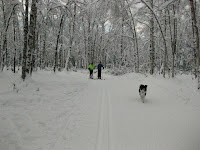
I went cross country skiing today after lunch. What a treat to go off into the woods and just glide along through the exquisite snowy wonderland. There were a few other skiers out, like these two with their dog. I even saw a guy on the smaller trail on his mountain bike. The trail was firm enough that he was just leaving a slight track, so that's ok.
 But most of the time it was just me and trees and the snow and here, the water.
But most of the time it was just me and trees and the snow and here, the water.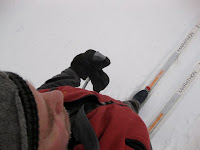
And everyone looked so healthy with bright rosy cheeks. At first my finger tips got cold, but eventually my hands were nice and warm.

And toward the end, I got onto the bridge near the parking lot and looked down at the mostly frozen Campbell Creek.

The bridge does seem like a bit of overkill just to allow skiers, hikers, and bikers to cross the creek.
This also seems like a good opportunity to show what kinds of manipulation someone can do with Photoshop. The Computer Art and Design class (Art 257) I took at UAA this past semester had us using Photoshop a lot. One form of manipulation is changing the content of the picture - cutting out people you don't want in, adding others in, cleaning up the junk, etc. Obama's First Day in the Oval Office that I posted early is an example of extreme doctoring, though I left the style of most of the added pictures as they were so it would be clear that different people from different times were added into one picture. Though I did colorize Frederick Douglass and Jackie Robinson, and played with the color of some of the others. Journalistically, this is - or was - a big no-no.

Original undoctored picture
But what about the kind of manipulation I do below? I'm just using the built in filters in Photoshop and applying them to the same image. Well, it isn't quite that simple because for most of the filters you can move levers that make the effects more or less distinct. Is it ethical to doctor pictures this way? Make the sky more blue? The contrast better? I suspect that war is already lost. I even do it here - but those tend to be more pictures that don't have a political impact rather than 'news' pictures, and the differences is usually so minor it doesn't seem worth it to add a disclosure. But everything is political in that it affects how we see reality and thus how we act on what we see. So if my pictures prettify my subjects that affects how viewers perceive those subjects. And some of these obviously are not natural photos. So, take a look. Here's the original big, and then the variations of the same picture using different Photoshop filters.
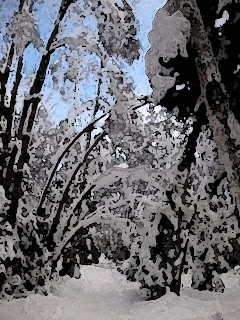
Watercolor filter
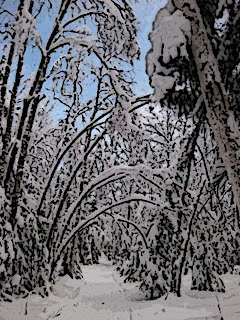
Posteredges filter

Plasticwrap filter
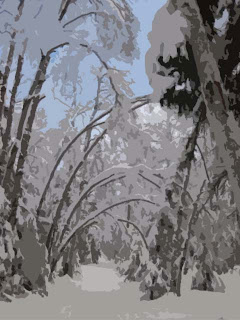
Cutout filter

Playing with the Hue, Saturation, and Light

Solarize filter
Subscribe to:
Posts (Atom)